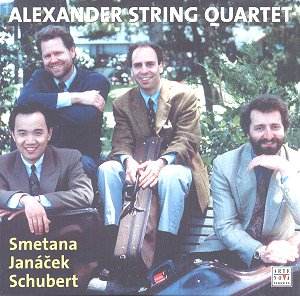 |
Bedrich SMETANA
(1824-1884) String Quartet No. 1 in E minor 'From my Life' Leos JANACEK(1854-1928) String Quartet No. 1 'The Kreutzer Sonata' Franz SCHUBERT (1797-1828) Quartettsatz in C minor Rec 1994, St Stephen's Church, Belvedere, CA Crotchet AmazonUK AmazonUS Amazon recommendations |
The Alexander String Quartet have been playing together for nearly twenty years. They first made a strong impression back in 1985 when they claimed first prize at the London (formerly Portsmouth) String Quartet Competition.
This programme of Schubert, Janacek and Smetana was recorded in 1994, but the performances sound completely fresh and invigorating, captured in vivid, well balanced sound. Perhaps the perspective might have a little more depth, so that internal balances could be better appreciated, but the quality is sufficient to allow the natural bloom of the players' tone to make its mark.
Schubert's Quartettsatz (Quartet Movement) is a full sonata structure which bristles with rhythmic tension, so much so that it has become a popular work despite being a torso. The Alexander Quartet play the music up to tempo, releasing torrents of semiquavers with great emotional fire.
A wider expressive range is found in the two four-movement quartets which dominate the programme. Both these have an autobiographical nature, and both hail from the Czech tradition.
The theme of Leo Tolstoy's novel 'The Kreutzer Sonata' is that of love outside marriage, a theme the sixty-year old Janacek knew well enough during the 1920s, when his obsession for Kamilla Stösslova, a young married woman, inspired practically everything he composed. The distinctive features of the Quartet No. 1 are certainly delivered in this lively performance, which achieves both structural unity and a wide expressive range. The ensemble's well rehearsed teamwork is evidently at the centre of the performance, and the music's daunting technical demands are triumphantly met.
Smetana made the tragedy of his own life the mainspring of his Quartet No. 1, going so far as to call it 'From my Life'. More than Janacek's Quartet, this has affinities with the traditional four movement plan of the classical style, though the music's distinctive personal and national elements cannot to be overlooked. Thus the dancing polka rhythms of the scherzo are found alongside a lively sonata development in the outer movements, and there is a deeply felt slow movement. The most celebrated feature of the work is the insistent high-pitched sound of the first violin towards the end of the finale, signifying the tinnitis which would eventually turn the composer towards despair and madness. All these features are captured in the Alexander Quartet's eloquent, committed performance, which has great emotional intensity in the context of clear-headed structural control.
Terry Barfoot